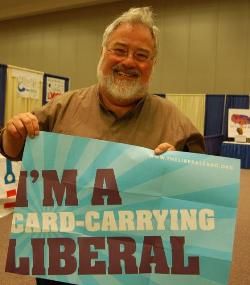UC Berkeley prof behind invest/spend semantic ploy
by Chris Reed | June 12, 2014 11:15 am
AP reporter Judy Lin had a fun story[1] Wednesday about how Democrats are playing the semantic spin game:
“SACRAMENTO, Calif. — As billions of dollars in unexpected tax revenue pour into California, Democratic lawmakers have proposed all kinds of ways to distribute the windfall after years of recession-era budget cuts.
“Just don’t call it spending. In recent weeks, Democrats have been using a more palatable and fiscally responsible term to characterize their individual priorities.
“Instead of spending the taxpayer surplus, they want to invest it.
“Last week, Assemblywoman Nancy Skinner, D-Berkeley, opened up a joint legislative budget committee hearing by saying she hopes the state will make ‘meaningful and strategic investments in early and higher education, in health care access and closing that opportunity gap.'”
Meet linguistics guru George Lakoff
 But there’s a very specific history to this ploy that AP doesn’t seem to know about. I wrote about it[2] in 2008:
But there’s a very specific history to this ploy that AP doesn’t seem to know about. I wrote about it[2] in 2008:
“A few years ago, the theories of George Lakoff, a UC Berkeley linguist, were all the rage. He argued that Democrats were then in the doldrums because they were inept at framing issues.
“One of his main suggestions: Dems should describe government spending as an ‘investment’ and spending decisions as choices on where to ‘invest.’
“This is a joke, of course, a severe and misleading twist on the traditional meaning of invest and investment. Salaries and benefits paid to government employees are not ‘investments.’ Transfer payments to poor people are not ‘investments.’
“Given the fact that experts say there’s no correlation between school spending and student performance, it’s also absurd to call education spending an ‘investment.’ But all’s fair in politics, so it made sense for Dems to use this ‘frame’ to make their case.
“But why would journalists — unless they also had an agenda designed to change the way voters thought about government spending?”
Most enthusiastic user of ‘invest’ euphemism was a journo
What’s funny is what my 2008 research turned up:
Which brings us Los Angeles Times’ Sacramento-bureau reporter Evan Halper. Look at the shameless way he employs Lakoff’s “framing” technique in his ostensibly straight news reporting:
“September 21, 2008: Come winter, emergency cuts will probably be needed. Proposals to invest in — or merely maintain — the state’s roads, schools and healthcare facilities will be put on the shelf again.
“August 16, 2008: Some needs of government are unpredictable, and placing strict formulas on how the state spends its money could ultimately squeeze schools, healthcare services, the prison system and other government programs that polls suggest voters want the state to invest in.
“August 16, 2008: Assembly Budget Committee Vice Chairman Roger Niello … defended the GOP formula, saying it allows for enough spending growth to steadily increase investments in education and healthcare.
“January 11, 2008: Gov. Arnold Schwarzenegger’s ambitious policy agenda collided with fiscal reality Thursday as he rolled out a proposed budget that threatens to unravel his investment in schools, healthcare and criminal justice programs.”
Six years later, AP’s Sacramento bureau thinks this is a heavy-handed semantic game. Back in 2008, the LAT’s Sacramento bureau chief thought it was an appropriate use in straight news reporting.
Draw your own conclusions.
- fun story: http://www.sacbee.com/2014/06/11/6476065/california-democrats-replace-spend.html
- about it: http://calwatchdog.com/2012/10/04/the-california-roots-of-the-obama-trope-of-calling-government-spending-an-investment/
Source URL: https://calwatchdog.com/2014/06/12/uc-berkeley-prof-behind-invest-not-spend-ploy/